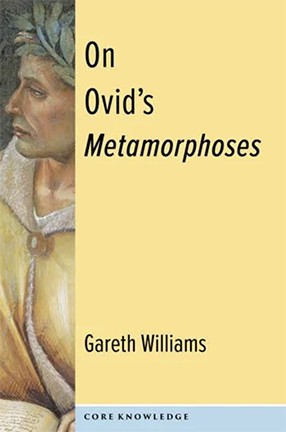Here’s Why Ovid’s “Metamorphoses” Is Popular Once Again
Gareth Williams’ new book explains why the classic poem is just right for our times.

Ovid’s Metamorphoses has entranced audiences for 2,000 years, from Rome under Augustus to humanities classrooms today. Borrowing liberally from Greek and Roman mythology, the poem tells hundreds of stories that share one essential them: Each tale depicts a transformation from one physical form into another.
In On Ovid’s Metamorphoses, Gareth Williams, the Anthon Professor of Latin Language and Literature, offers a brisk, lively reading of the poem, which emphasizes why it speaks in compelling ways to a contemporary audience. He shows how the Metamorphoses is not just a colorful collection of stories about change, but also an exploration of change itself. Ovid challenges us to recognize flux as fundamental to human experience—circumstances shift, fortunes ebb and flow, and our identities ceaselessly evolve from one life stage to another.
Columbia News caught up with Williams recently to hear his thoughts on the book, along with what he reads when not teaching classics, and who would be seated around his dinner table at his next party.
How did this book come about?
The Core Knowledge book series (published by Columbia University Press) was launched several years ago in recognition of the centennial of the Core Curriculum. The early stage of the series was overseen by its pioneer and first managing editor, the late Professor Deborah Martinsen. It remains a source of great sadness that she did not live to see the publication of the first two volumes in the series: mine on Ovid’s Metamorphoses, and Philip Kitcher’s on John Stuart Mill.

Why did interest in Ovid fade after the Renaissance, and experience a resurgence of attention in the late 20th century?
Because of his dazzling verbal wit and playfulness, Ovid has tended over the centuries to be viewed in some quarters as lacking the gravitas of Virgil in particular. Given the two World Wars and the many other horrors of the 20th century, that epoch was often recognized as much more Virgilian than Ovidian in its sensibility. But as the century came to an end, Ovid’s eye for the skeptical questioning of our political leaders, for the ceaseless changefulness of human experience, for the eccentricities and nonconformity of so many behavioral types, and for ironic commentary on the vagaries of life—all of these features and more resulted in an Ovid revival. His Metamorphoses provides a powerful point of contact for 21st-century existence.
What sort of books do you enjoy reading for pleasure?
Jane Austen, Conan Doyle’s Sherlock Holmes stories, and Virginia Woolf.
Are there any classic novels that you only recently read for the first time?
George Eliot’s Middlemarch.
What are you teaching this semester?
A graduate-level survey of Latin Literature of the Early Empire, and an advanced-undergraduate/graduate-level course on Roman Oratory.
Who would you invite to a dinner party, and why?
Ovid—his inventive imagination and depth of learning are both breathtaking, but his wit and sparkle are also inimitable.
Socrates—endlessly inquisitive and deeply questioning about life.
Virginia Woolf—always full of surprise, ever appealing to the imagination, verbal spark, and razor-sharp powers of human observation.